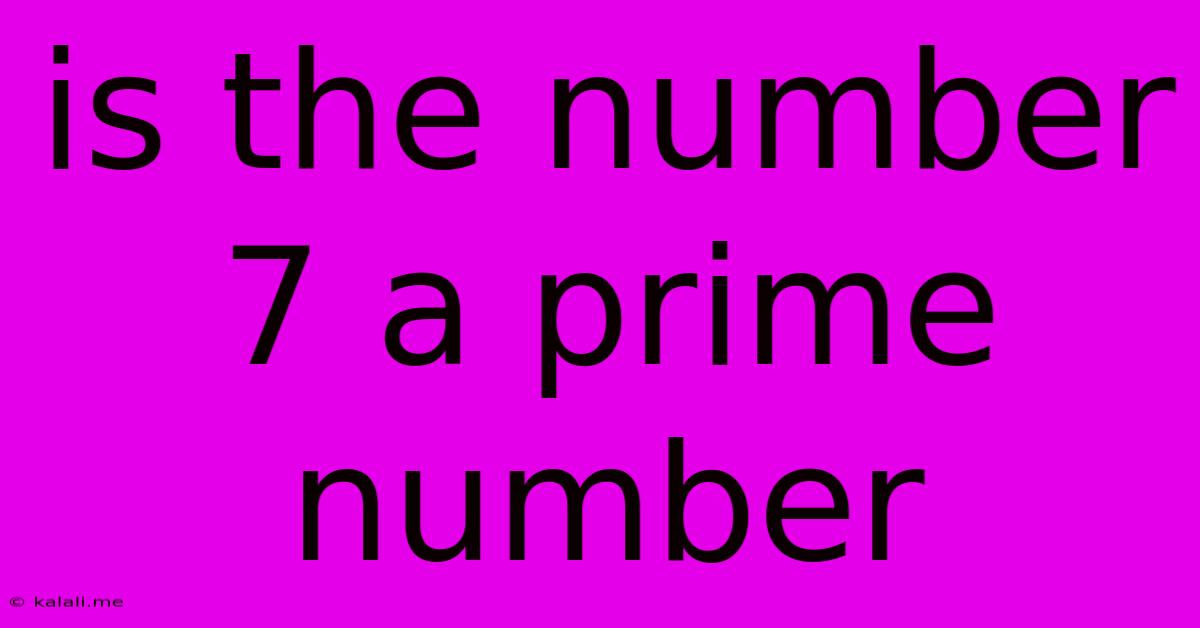Is The Number 7 A Prime Number
Kalali
May 10, 2025 · 3 min read

Table of Contents
Is the Number 7 a Prime Number? A Deep Dive into Prime Numbers and Divisibility
Is 7 a prime number? The short answer is yes, but let's explore why. This seemingly simple question opens the door to understanding fundamental concepts in number theory, specifically the definition and properties of prime numbers. This article will not only definitively answer the question but also provide you with a deeper understanding of prime numbers and how to identify them.
What are Prime Numbers?
A prime number is a natural number greater than 1 that has no positive divisors other than 1 and itself. In simpler terms, it's a number that's only divisible by 1 and itself without leaving a remainder. Understanding this definition is key to determining whether any number, including 7, is prime.
Why 7 is a Prime Number
To determine if 7 is a prime number, we need to check if it's divisible by any number other than 1 and 7. Let's examine its divisors:
- 1: 7 divided by 1 equals 7 (7/1 = 7).
- 2: 7 divided by 2 equals 3.5 (7/2 = 3.5), which is not a whole number.
- 3: 7 divided by 3 equals 2.333... (7/3 ≈ 2.333...), which is not a whole number.
- 4: 7 divided by 4 equals 1.75 (7/4 = 1.75), which is not a whole number.
- 5: 7 divided by 5 equals 1.4 (7/5 = 1.4), which is not a whole number.
- 6: 7 divided by 6 equals 1.166... (7/6 ≈ 1.166...), which is not a whole number.
- 7: 7 divided by 7 equals 1 (7/7 = 1).
As you can see, the only whole numbers that divide 7 without leaving a remainder are 1 and 7 itself. Therefore, 7 satisfies the definition of a prime number.
Identifying Prime Numbers: A Practical Approach
While checking for divisors is straightforward for smaller numbers like 7, it becomes more computationally intensive for larger numbers. However, there are several strategies you can use:
-
Trial Division: This is the method we used above. It involves checking for divisibility by all prime numbers less than the square root of the number in question. This is because if a number has a divisor larger than its square root, it must also have a divisor smaller than its square root.
-
Sieve of Eratosthenes: This is an ancient algorithm for finding all prime numbers up to a specified integer. It's a highly efficient method for generating lists of primes.
-
Primality Tests: For very large numbers, sophisticated primality tests are used to determine primality efficiently. These tests are beyond the scope of this introductory discussion but are crucial in cryptography and other fields.
Conclusion: 7's Prime Status and its Significance
So, definitively, 7 is a prime number. Its prime status is not just a mathematical fact; it’s a building block in countless mathematical concepts and applications. Understanding prime numbers is fundamental to number theory, cryptography, and computer science. This exploration of 7's primality serves as a gateway to a deeper appreciation of these fascinating numbers and their importance in the world of mathematics.
Latest Posts
Latest Posts
-
Pokemon Mystery Dungeon Red Rescue Team Codes
Jul 05, 2025
-
How Much Is 25 20 Dollar Bills
Jul 05, 2025
-
How Many Apples In 3 Lb Bag
Jul 05, 2025
-
What Is Half A Quarter Of 400
Jul 05, 2025
-
How Do You Make A Vegetable Necklace
Jul 05, 2025
Related Post
Thank you for visiting our website which covers about Is The Number 7 A Prime Number . We hope the information provided has been useful to you. Feel free to contact us if you have any questions or need further assistance. See you next time and don't miss to bookmark.